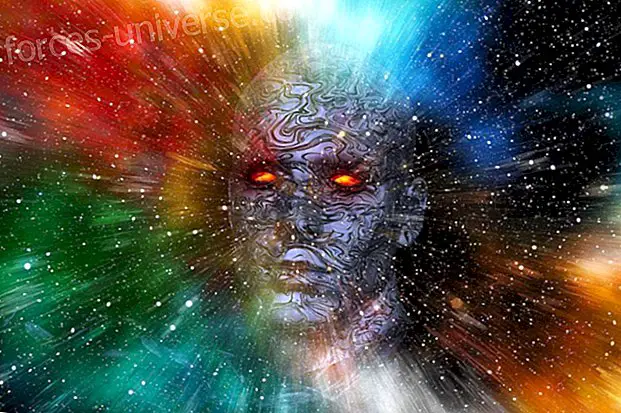Ontology is the study of being . Its focus is on the resolution of several questions related to existence: what things exist ?, What categories belong ?, Are the numbers physical properties or just ideas ?, Is there such a thing as objective reality ?, among many Another questions.
Very briefly in this Text I want to tell you the main thing about Ontology, definition, authors and examples.
So, I invite you to feel comfortable and get ready to experience a basic approach to the exciting world of Philosophy .
What is the ontology?

The term Ontology is defined by the Royal Academy of the Spanish Language as the philosophical study of the being in general and of its transcendental properties, that is, of the which applies neutrally to everything that is real.
This word comes from ancient Greek, lexically it is composed of two voices from the same language, "ontos" and "logos".
"Ontos" or "οντος" translates "being", and "logos" or "λóγος" means, poorly translated, "theory", "study" or "science" . I say badly translated because λóγος is one of those words that when translated into Spanish loses its essence of Greek.
Ontology was called "first philosophy" by Aristotle in book IV of his work "Metaphysics."
The Latin term Ontology, as "science of being, " was invented by the German philosopher and pedagogue Jacob Lorhard (Lorhardus) and first appeared in his work Ogdoas Scholastica in its 1st edition in 1606.
It came into general circulation after being popularized by German rationalist and philosopher Christian Freiherr von Wolff in his Latin writings, especially in Philosophia Prima sive Ontologia (1730; "First Philosophy or Ontology").
What does the verb "to be" mean?

Some of these questions may seem abstract and not very useful, but they are, and have always been, highly important for philosophers, especially for those who believe in the theory in epistemology of foundationalism .
Foundationalist philosophers believe that to get to the truth it is necessary to start with the most fundamental issues, to be sure about the foundations of philosophy, and then move on from there to more specific questions.
If you believe in foundationalism, then probably the most important questions are the ontological questions .
Ontology is also very relevant for writers, intellectuals, religions and spirituality.
No matter what your beliefs about spirituality, if you look at them in detail, they all have an ontological dimension .
Look at some examples of ontological statements :
- Everything is made of atoms and energy.
- Everything is made of conscience.
- You have a soul
- You have a mind
- Do you exist
So far it has been clear what I wanted to let you know about Ontology and its field of action? Hope so!
Now we will begin to delve deeper into the subject and see what is hidden in Ontology and Metaphysics .
Ontology and Metaphysics, what are its fields of action?

Ontology is generally considered a subfield of metaphysics.
Metaphysics has many definitions, but one of its most glorious and profound meanings comes from Aristotle, in which he defines Metaphysics as the "study of being as being", and the study of eternal and immaterial entities or Motionless Motor (beings divine).
Already in the seventeenth century the term Ontology begins to be defined as the "study of being as being", and even, the immaterial and eternal entities begin to be the object of investigation through the so-called "rational theology."
It should be noted that the original origin of Metaphysics, that is, "meta ta physiká" is a denomination that translates "those after Physics", named after the category of Aristotle's books that did not fit into existing categories.
Remember that the term comes from the Latin "metaphysica", and this from the Greek μετὰ [τὰ] φυσικά, which translates "beyond nature."
In short, and evolving thousands and thousands of years, Metaphysics means something like "the study of the fundamental nature of reality"
So, clearly, this is closely related to ontological issues .
There is a special incorporation between Ontology and Metaphysics, which covers questions such as "what is existence?", Or "how do things exist?"
However, as a general rule I can tell you that Ontology asks what questions, while Metaphysics asks how you ask them .
Let's look at an example so that the ideas are clarified in a good panorama.
The difference between Ontology and Metaphysics may be easier to understand if you look at an invented world.
Observe and reflect on a fantasy world like JRR Tolkien's Middle-Earth .
When comparing it with our world, you will see that the Ontology manifests there is different from ours because it has all kinds of things, such as elves, dwarves, ents, orcs and dark lords, which do not exist in our world.
But, if you look at it from its Metaphysics, you will see that it is different from ours because it has a fundamentally different nature, which involves magic and certain special powers.
Middle-earth, the novel we talked about, not only has different things in it, things play and are dimensioned by different rules.
Ontology studies things, while Metaphysics studies the rules.
Is it clear? Let's go a little further and see Ontology and Epistemology,
Ontology VS Epistemology

Many times Ontology and Metaphysics are confused with Epistemology, however, epistemology is easier to separate.
Epistemology is the study of knowledge, of how we know what we know.
While Ontology and Metaphysics refer to reality, Epistemology is about how human consciousness can interact with that reality.
Look at some issues that cover Ontology, Metaphysics and Epistemology .
- Are there souls? Are they the kind of things that obey physical laws?
- Is there a god?
- What physical laws would have to be true for souls to exist?
- What rules, if any, govern the actions of God?
- How can we know if souls exist?
- Can human beings ever know if there is a God?
Famous phrases about Ontology

I want us to analyze together two extremely important quotes that reflect the Ontology in their creation.
Look at appointment # 1 :
Beyond the fiction of reality, there is the reality of fiction . (Slavoj Zizek)
Slavoj Zizek is a Slovenian philosopher, very influential in certain philosophical circles.
His Ontology is difficult to describe in its most specific aspects, however, to begin with, like many philosophers, there is a deep division between reality and reality. language.
Language separates the world into all kinds of different parts and categories, but those categories are little more than useful fictions .
Fictions, however, are true stories about fictional categories . Or, in other words, everything we can say about reality is fictional, but the language itself is a reality of its own .
Let's move on and analyze appointment # 2 :
You have no soul. You are a soul You have a body. (Encouragement)
This quote, often incorrectly attributed to CS Lewis, probably comes from any magazine in the 1890s.
Advocate for a very particular Ontological perspective: souls exist (clearly an Ontological affirmation), but they are not the kind of things you can have or possess (an Ontological affirmation / Metaphysics ). Bodies, on the other hand, belong to that category, but the consciousness that currently reads these words is a soul.
What do you think of these quotes? They are beautiful and deep!
The history and importance of the Ontology

In a sense, Ontology is one of the oldest forms of philosophy .
A monkey climbs a tree hoping to find wild figs; Some would say that the monkey's behavior suggests the Ontological question of whether there are figs up there. It is not a very elaborate or philosophical type of Ontology, but it is the same type of general question.
The Greek philosophers were somewhat obsessive Ontologists in their desire for a complete knowledge of the world, they tended to categorize things and discuss what categories should be and what they should belong to.
For example, Aristotle made a very influential argument about the "Staircase of Nature", which placed non-living beings in the background (for example, rocks and clouds), then moved to plants, then to animals and finally to human beings.
This is an Ontological theory of the natural world, and it had a great impact on medieval philosophy and far-reaching implications for Aristotle's moral theory .
This type of Ontology was not practiced only in the West: Arab, Indian and Chinese philosophers also studied the world around them, deduced general "rules" of existence and tried to categorize things.
Thanks to the global commercial networks of the ancient and medieval worlds, these philosophers influenced each other; the Arabs argued about Aristotle, the Romans argued about the Vedic traditions of India, and so on .
These traditions of Ontology were never completely separated from each other.
On the other hand, the scientific revolution caused a profound change in Ontology .
Many of the first scientists realized that the only way to be sure that they were discovering truths about nature was to forget anything (at least while doing science) that could not be proven, which seems to include supernatural beings, divine forces and souls.
Only physical laws, matter and energy seem to be measurable and obey reliable laws .
Many of them also had religious beliefs, and some even performed experiments related to the supernatural, but for the most part, they found it necessary to assume that only the material world exists to carry out sensible experiments and derive laws of nature .
This scientific Ontology has been so successful in terms of understanding nature and controlling it that it has come to dominate the way we think, especially, and even, for some people, religion.
For example, there are institutes in the world that seek to "prove" or "refute" the existence of God through experiment . But this seems a bit confusing and certainly would have surprised both believers and scientists during the scientific revolution.
Most of them would have told him that God does exist, it is not the kind of thing that can be proved or refuted by experiment, that God belongs to a different Ontological category of the natural phenomena we observe in science .
Ontology in popular culture

Let's look at some examples of Ontology in popular culture, you will see that many doubts we had so far, will begin to be clarified.
Example 1
In the original Star Wars movies, the Force is presented as an omnomatic semi-mystical force, a field of energy created by all living beings that seems go beyond natural law as we know it.
But in the prequels, literary, theatrical and cinematographic works, the Force is presented in more scientific terms; We learn that there are small microorganisms called midichlorians that live in the blood currents of human beings.
This makes a difference for the Star Wars universe Ontology because it adds a new kind of being, and Metaphysics also changes because the Star Wars universe now plays with a little scientific rules. more family.
Example # 2
Game of Thrones is a rare example of a fantasy story with a very strange Ontology but a very realistic Metaphysics .
In this story, there are dragons, giants, zombies and all kinds of other fantastic creatures that don't exist in the real world.
However, all these creatures behave in accordance with fairly familiar laws, which gives the series a more realistic sensation.
At certain points, the program includes magic, but it is relatively rare and always seems surprising because, otherwise, the program is hyperrealistic.
Due to the relative absence of magic, it can be said that the show has a fairly realistic metaphysics despite its fantasy Ontology.
Examples opened up all you wanted, and we could even address historically more recent works, however, we would stay here, reading and writing, And the idea is to capture the most important.
I invite you to do personal research if you wish to deepen in special matters.
Controversies

There are controversies of different kinds in the world of Ontology, let's see some arguments that are easier to understand, but really deep.
Ontology: Should it bother us?
Many students fall asleep during Ontology conferences or classes, and even many professional philosophers do not practice Ontology .
They argue that "being" is a vague idea, perhaps just an artifact of language, and that it makes no sense to analyze it intensely; The verb "to be" is only a useful tool that human beings have evolved to spend their daily lives.
It has no specific meaning and, therefore, Ontology is looking for something that is not there.
Some argue that it makes no sense that philosophers try to discover what exists in the universe, which we should instead leave in the hands of scientists.
Of course, this argument finds strong resistance from many philosophers who treat Ontology as something central; Do you remember the foundationalists we talked about initially? They would not agree that Ontology is meaningless, they would die of anguish.
In addition, Ontology and Metaphysics have gained some new energy lately, this, thanks to the mystical implications of quantum physics and the science of consciousness, which are turning many scientists into philosophers, and vice versa.
Do you think that scientists are the only ones who should appreciate, reflect and discover what exists in the universe? How did you think about this Article on Ontology ?
Ontology and Psychology
Obviously, Psychology and Ontology have a purely direct influence as to their object of intervention.
Since the nature of Ontology is the study of reality and existence, its interpretation and the consequent influence on Psychology and any subject would always be fundamental.
However, it is also an issue that people rarely think about, so the nature of existence is usually taken for granted or not, even for experts and academics in their field.
So, I could really argue that it actually has very little or no influence on most issues because it simply is not considered relevant or has any practical use. Of course, if one considers reality as something totally subjective .
Therefore, the individual only takes into account his own understanding of the world and uses it to guide every action / decision he makes or makes . This could certainly lead to a kind of apathy, psychosis.
By not considering any other Ontological point of view, that is, the feelings and opinions of others, the individual has no care or understanding of them, therefore, apathy.
As with so many things, I think all this can be placed on a spectrum.
Most or all people would believe that some things are real outside their own understanding and other things that are exactly and only how they understand it.
In this way, they can achieve a balance of, for example, arrogance, ignorance, intellect and empathy.
Of course, our understanding of reality is influenced by all our experiences .
Psychology seen both from nature and from maintenance, that is, genetics and social psychology, will directly influence their interpretation of the world around them, reality .
Sensory observations can be greatly influenced by their psychological state and be major influences in the way they perceive and interpret the nature of reality.
Then, how you observe reality, in turn, will affect your psychological state. The two directly influence each other.
From the Psychoanalysis
I want us to address the main ideas of the Belgian philosopher Jaap van Brakel exposed in several of his works.
Brakel's central idea is that psychoanalytic theory is a general scientific theory of the mind that could explain mental processes in general, as well as pathological mental states. Individual logicians.
Brakel developed this thesis in previous books (Brakel 2009, 2010), and it is useful to read it taking into account all his works.
As Brakel puts it, the theory is based on three assumptions: psychological continuity, psychological determinism and the existence of a dynamic unconscious.
It postulates the existence of two types of mint (mental activity): the primary a-rational and associative process, and the rational secondary process that follows the rules. It invokes free association as a methodological tool, Ontology as the foundation of being.
Actually, there is much to say about Ontology, however, it is important that you increase your knowledge from personal research.
Very especially I invite you so that you are very aware of our next publications, excellent material we are preparing for you, we wish you abundant successes and blessings, a Hug of Light!

Author : William Hernán Estrada Pérez, Editor in the Great Family of https://hermandadblanca.org/






